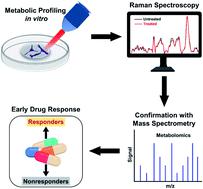当前位置:
X-MOL 学术
›
Chem. Sci.
›
论文详情
Our official English website, www.x-mol.net, welcomes your feedback! (Note: you will need to create a separate account there.)
Probing metabolic alterations in breast cancer in response to molecular inhibitors with Raman spectroscopy and validated with mass spectrometry
Chemical Science ( IF 8.4 ) Pub Date : 2020-08-20 , DOI: 10.1039/d0sc02221g Xiaona Wen, Yu-Chuan Ou, Galina Bogatcheva, Giju Thomas, Anita Mahadevan-Jansen, Bhuminder Singh, Eugene C. Lin, Rizia Bardhan
Chemical Science ( IF 8.4 ) Pub Date : 2020-08-20 , DOI: 10.1039/d0sc02221g Xiaona Wen, Yu-Chuan Ou, Galina Bogatcheva, Giju Thomas, Anita Mahadevan-Jansen, Bhuminder Singh, Eugene C. Lin, Rizia Bardhan

|
Rapid and accurate response to targeted therapies is critical to differentiate tumors that are resistant to treatment early in the regimen. In this work, we demonstrate a rapid, noninvasive, and label-free approach to evaluate treatment response to molecular inhibitors in breast cancer (BC) cells with Raman spectroscopy (RS). Metabolic reprogramming in BC was probed with RS and multivariate analysis was applied to classify the cells into responsive or nonresponsive groups as a function of drug dosage, drug type, and cell type. Metabolites identified with RS were then validated with mass spectrometry (MS). We treated triple-negative BC cells with Trametinib, an inhibitor of the extracellular-signal-regulated kinase (ERK) pathway. Changes measured with both RS and MS corresponding to membrane phospholipids, amino acids, lipids and fatty acids indicated that these BC cells were responsive to treatment. Comparatively, minimal metabolic changes were observed post-treatment with Alpelisib, an inhibitor of the mammalian target of rapamycin (mTOR) pathway, indicating treatment resistance. These findings were corroborated with cell viability assay and immunoblotting. We also showed estrogen receptor-positive MCF-7 cells were nonresponsive to Trametinib with minimal metabolic and viability changes. Our findings support that oncometabolites identified with RS will ultimately enable rapid drug screening in patients ensuring patients receive the most effective treatment at the earliest time point.
中文翻译:

用拉曼光谱探测乳腺癌对分子抑制剂的反应,并用质谱法进行验证
对靶向治疗的快速和准确反应对于区分治疗早期对治疗耐药的肿瘤至关重要。在这项工作中,我们展示了一种快速、非侵入性和无标记的方法,用拉曼光谱 (RS) 评估乳腺癌 (BC) 细胞中分子抑制剂的治疗反应。用 RS 探测 BC 中的代谢重编程,并应用多变量分析根据药物剂量、药物类型和细胞类型将细胞分为反应组或非反应组。然后用质谱 (MS) 验证用 RS 鉴定的代谢物。我们用 Trametinib(一种细胞外信号调节激酶 (ERK) 通路的抑制剂)处理三阴性 BC 细胞。用 RS 和 MS 测量的变化对应于膜磷脂、氨基酸、脂质和脂肪酸表明这些 BC 细胞对治疗有反应。相比之下,在用哺乳动物雷帕霉素靶蛋白 (mTOR) 途径抑制剂 Alpelisib 治疗后观察到最小的代谢变化,表明治疗耐药。细胞活力测定和免疫印迹证实了这些发现。我们还显示雌激素受体阳性 MCF-7 细胞对曲美替尼无反应,代谢和活力变化最小。我们的研究结果支持,用 RS 鉴定的癌代谢物最终将能够对患者进行快速药物筛选,确保患者在最早的时间点接受最有效的治疗。哺乳动物雷帕霉素靶蛋白 (mTOR) 通路的抑制剂,表明治疗耐药。细胞活力测定和免疫印迹证实了这些发现。我们还显示雌激素受体阳性 MCF-7 细胞对曲美替尼无反应,代谢和活力变化最小。我们的研究结果支持,用 RS 鉴定的癌代谢物最终将能够对患者进行快速药物筛选,确保患者在最早的时间点接受最有效的治疗。哺乳动物雷帕霉素靶蛋白 (mTOR) 通路的抑制剂,表明治疗耐药。细胞活力测定和免疫印迹证实了这些发现。我们还显示雌激素受体阳性 MCF-7 细胞对曲美替尼无反应,代谢和活力变化最小。我们的研究结果支持,用 RS 鉴定的癌代谢物最终将能够对患者进行快速药物筛选,确保患者在最早的时间点接受最有效的治疗。
更新日期:2020-09-23
中文翻译:

用拉曼光谱探测乳腺癌对分子抑制剂的反应,并用质谱法进行验证
对靶向治疗的快速和准确反应对于区分治疗早期对治疗耐药的肿瘤至关重要。在这项工作中,我们展示了一种快速、非侵入性和无标记的方法,用拉曼光谱 (RS) 评估乳腺癌 (BC) 细胞中分子抑制剂的治疗反应。用 RS 探测 BC 中的代谢重编程,并应用多变量分析根据药物剂量、药物类型和细胞类型将细胞分为反应组或非反应组。然后用质谱 (MS) 验证用 RS 鉴定的代谢物。我们用 Trametinib(一种细胞外信号调节激酶 (ERK) 通路的抑制剂)处理三阴性 BC 细胞。用 RS 和 MS 测量的变化对应于膜磷脂、氨基酸、脂质和脂肪酸表明这些 BC 细胞对治疗有反应。相比之下,在用哺乳动物雷帕霉素靶蛋白 (mTOR) 途径抑制剂 Alpelisib 治疗后观察到最小的代谢变化,表明治疗耐药。细胞活力测定和免疫印迹证实了这些发现。我们还显示雌激素受体阳性 MCF-7 细胞对曲美替尼无反应,代谢和活力变化最小。我们的研究结果支持,用 RS 鉴定的癌代谢物最终将能够对患者进行快速药物筛选,确保患者在最早的时间点接受最有效的治疗。哺乳动物雷帕霉素靶蛋白 (mTOR) 通路的抑制剂,表明治疗耐药。细胞活力测定和免疫印迹证实了这些发现。我们还显示雌激素受体阳性 MCF-7 细胞对曲美替尼无反应,代谢和活力变化最小。我们的研究结果支持,用 RS 鉴定的癌代谢物最终将能够对患者进行快速药物筛选,确保患者在最早的时间点接受最有效的治疗。哺乳动物雷帕霉素靶蛋白 (mTOR) 通路的抑制剂,表明治疗耐药。细胞活力测定和免疫印迹证实了这些发现。我们还显示雌激素受体阳性 MCF-7 细胞对曲美替尼无反应,代谢和活力变化最小。我们的研究结果支持,用 RS 鉴定的癌代谢物最终将能够对患者进行快速药物筛选,确保患者在最早的时间点接受最有效的治疗。


























 京公网安备 11010802027423号
京公网安备 11010802027423号